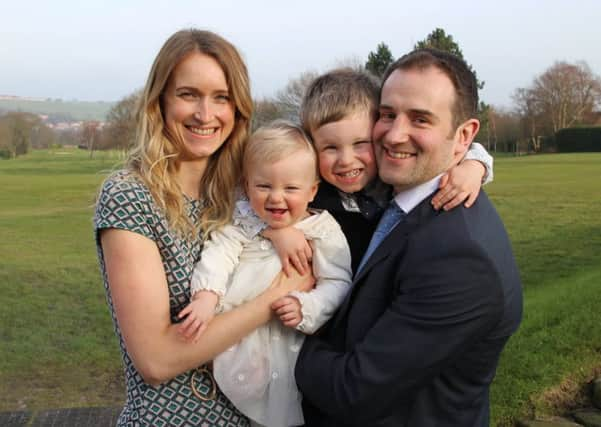We'll make sure we keep Nick's memory alive


Nick was diagnosed with Motor Neurone Disease (MND) in September last year and died on December 20, aged 38.
He was born in Halifax and lived in Lightcliffe, and worked as a management accountant at Locala in Batley.
Advertisement
Hide AdAdvertisement
Hide AdNick, who leaves wife of nearly 10 years Rachel and two children, Hadyn, five, and Georgia, two, played more than 400 times for Siddal - a club he’d been part of since age of eight.
More than 600 people attended his funeral last week. His brother-in-law Stephen Naylor said: “It’s been heartbreaking. I think we’re all coping as well as we can.
“Rachel’s been amazingly strong for the two little ones.
“It’s been a hard few weeks. His lasting legacy is his two beautiful children.
“No-one will ever forget him. He’ll be a Siddal legend forever. We’ll all make sure his memory is kept alive through his children.
Advertisement
Hide AdAdvertisement
Hide Ad“All the family and all his friends will always remember Nick to them and make sure they know how great their dad was.
“He was an amazing dad and husband. He would always go out of his way to help others.
“Him and Rachel met in the Coliseum in Halifax in 1997, when Nick was 17. They’ve been married 10 years and they were just the perfect couple.
“It’s testament to him how many people turned out for his funeral.
Advertisement
Hide AdAdvertisement
Hide Ad“The number of messages of support and sympathy have been overwhelming. He’d never have dreamed of that many people wanting to pay their respects to him. It was humbling to see so many people give up their time to come and say goodbye to him.”
Stephen says Nick’s health deteriorated far more quickly than anyone expected after he was diagnosed with MND.
“He always took care of himself, he was so fit,” Stephen said. “He was probably the fittest person I knew.
“He was diagnosed in September. Stephen Hawking has lived with the condition for 50 years but if you look at the figures, over a third of people who are diagnosed with it die within a year of getting it.
Advertisement
Hide AdAdvertisement
Hide Ad“It is so brutal, and Nick clearly had a particularly aggressive form of it because within three months of the diagnosis he was struggling to speak and feed himself.
“We started a fundraising campaign when he was diagnosed and had a big fundraiser at The Shay on November 26, and about 250 people came down.
“We raised tens of thousands of pounds to support Nick and the family, which was incredible and showed how much he was loved and respected.
“There were lots of things he couldn’t do within the house so we needed some equipment to help him.
Advertisement
Hide AdAdvertisement
Hide Ad“Nick was there and he stayed for four or five hours. But after that he went downhill quickly.
“On the Sunday before he died he had a bad chest and was taken into hospital, developed pneumonia and just couldn’t fight it.
“Once you’re diagnosed you know it’s life-shortening but none of us expected we’d have just three months.
“I struggle to think of a crueller disease. How it impacts people who are so fit and healthy one minute and then six months later, can’t communicate or eat.
Advertisement
Hide AdAdvertisement
Hide Ad“It’s devastating, just horrific. You must feel trapped in your own body and it was horrible to see.”
Stephen has sent his own research about MND to Calder Valley MP Craig Whittaker, who has promised to raise the issue with the Health Secretary.
“Because it’s so rare and people don’t live very long with it, it’s hard to research,” Stephen added.
“Most GPs will probably never see a case of it during their career.
Advertisement
Hide AdAdvertisement
Hide Ad“We want to raise awareness about what it is, the impact it has and we think there should be more research into it.
“We were fundraising for the Motor Neurone Disease Research Centre in Sheffield at Nick’s funeral.
“Nick had been there a week before he died and they were going to help with special collars and things like that.
“We know so little about it. There’s no real treatment, certainly no cure and we don’t really know how it happens.
Advertisement
Hide AdAdvertisement
Hide Ad“They don’t think it’s hereditary but there does seem to be some correlation between sports people and the condition.
“We need to know more about it, what causes it and find ways of treating it.
“We also need to do more to support those who are diagnosed with it.
“There is a misconception that people live with it, but in most cases they don’t.”